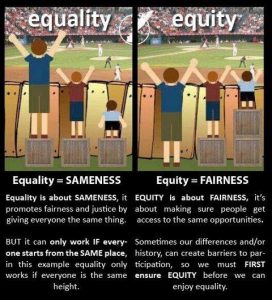A Teacher’s Philosophy
A two-pronged approach: Equity & Community
As a proponent of equitable practice, this philosophy is reflected in my practice as a high school teacher: I am tasked with creating innovative lessons that respond to, challenge, and manage individual (learning) backgrounds of kinds all students. As such, one of the most important objectives I have as an educator is creating a space that students feel comfortable engaging in, which is why I chose this particular topic for this inquiry project. In my own experiences, being in a new environment can often be alienating or uncomfortable when surrounded by individuals you aren’t familiar with, but are expected to share thoughts and communicate openly with. If we don’t start with equal footing and giving each other the opportunity to get to know where our voice speaks from, how can we respect each other and further learn from each other? Creating a comfortable classroom environment, or in even more specific terms, a learning community, requires a reciprocated understanding of respect and recognition of difference. Whether that diversity is in learning styles, cultural backgrounds, gendered identity, all these elements amalgamate into our identity as individuals and learners. Needless to say, equal footing doesn’t mean equal treatment, but creating spaces to recognize different students’ needs and respond to them.

Taken from: http://www.pugetsoundoff.org/blog/equality-versus-equity
This quick image helps explain the difference between treating individuals with equal or equitable practice by recognizing their histories and present individualities.
Arguably, yes, a classroom community space is dependent on what our definition of ‘community’ is, and is extremely subjective. Once creating this space, ideally students come to value and understand the importance of sustaining their community culture, even beyond the classroom. This basic premise of valuing individual’s needs and differences offers the basic premise of respect of listening and response, cultivating empathetic more responsible beings.
When I reflect back on the types of educational contexts that I’ve had the pleasure of engaging in, classroom setting or not, I see the value of bridging connections between the worlds that exist inside and outside of schools. Equipped with the frame of thought as an educator, it is with even more certainty that I value community-based experiential learning as a complement to classroom education, particularly as the culture of education shifts to an ‘inquiry’ approach. It is my hope as an educator to create opportunities for students to elevate their awareness about different kinds of communities and to explore the possibility of making lasting meaningful connections beyond the classroom. But, this philosophy is always changing… !